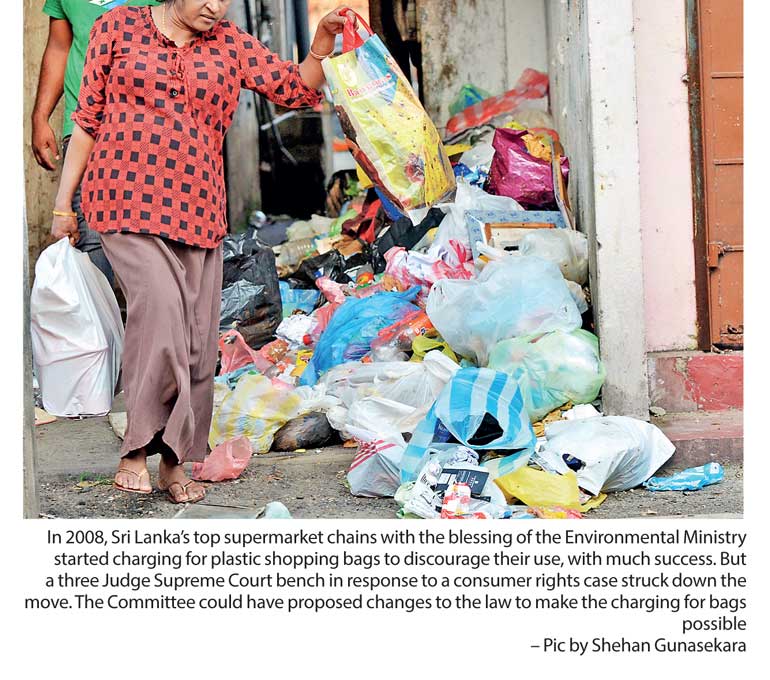Tuesday Feb 24, 2026
Tuesday Feb 24, 2026
Friday, 30 March 2018 00:05 - - {{hitsCtrl.values.hits}}

 The President retracted the ban of asbestos in the face of Russian pressures. The glyphosate ban is now under review in the face Japanese concerns regarding the alternative chemicals used in tea plantations. Now it is time to talk about the polythene ban, the third in the unholy trio of bans imposed by the President.
The President retracted the ban of asbestos in the face of Russian pressures. The glyphosate ban is now under review in the face Japanese concerns regarding the alternative chemicals used in tea plantations. Now it is time to talk about the polythene ban, the third in the unholy trio of bans imposed by the President.
Using my right to information, I received the report of the expert committee which was cited by the President in his Cabinet paper proposing the polythene ban. A quick look at the report shows the root of the problem. The report is yet another ‘lazy’ and irresponsible report consisting of a set of bulleted opinions presented as expert recommendations, with no evidence or arguments to support
As somebody wisely advised, if you can’t turn your bullet points into a narrative, you have a problem. In the same vein, a judge would say that a “judgment won’t write,” if the judge finds it difficult spell out his/her opinion supported by evidence and the law.
In Government, in contrast, expert committees appointed for various purposes have no problem producing lists of unsubstantiated opinions as recommendations. Typically, a committee meets a few times, with an unenthusiastic bureaucrat in charge. The few invited subject experts or stakeholders are vastly outnumbered by bureaucrats representing various departments. More often than not these few stakeholders don’t have enough time or the enthusiasm to make a contribution, except for those with axes to grind.
Why analyse when it is easier to opine?
In the parliamentary tradition, a white paper is an authoritative report or guide that is presented by policymakers prior to presenting a cabinet paper on an important topic. The objective is to inform and receive feedback from all stakeholders. With the Sri Lankan polity ready to pounce upon anything that looks like a policy, white papers have disappeared from the policy arena in Sri Lanka.
The present PM knows this only too well. The education white paper presented by him in 1981 was unduly criticised and had to be shelved. The ‘Regaining Sri Lanka’ document was one the best analytical policy documents ever presented in my opinion, but it was vilified by the Opposition.
Since then what we have are hastily put together Cabinet papers which try not to ruffle the feathers of the more vociferous stakeholders. There aren’t many politicians who would insist on the evidence, make the hard decisions based on the evidence, and take ownership for carrying the legislation through. More often than not the easy-lazy path is taken.
Popular opinions form the basis
The process usually starts with set of popular opinions. True to form, at their first meeting on 18 November 2016, the committee of experts appointed to find ways of managing polythene use was presented with a list of the following seven recommendations, presumably compiled by the Central Environment Authority (CEA), the agency in charge:
(1) To prohibit the use of polyethylene products as decorations
(2) To prohibit the manufacture of food containers, plates, cups, spoons from expanded polystyrene
(3) To prohibit the manufacture of non-biodegradable food wrappers and containers for liquids and liquid foods
(4) To prohibit the manufacture of banned polythene or plastic products
(5) Impose taxes to discourage non-biodegradable plastics
(6) Unnamed incentives to encourage use of biodegradable or reusable products
The committee at its first meeting consisted of 19 members of whom 14 represented various related Government agencies. The five outsiders included Professor Jagath Premachandra of University of Moratuwa, Hemantha Withanage of Centre for Environmental Justice, K.A. Jayarathna of Sevanatha, Vidyananda Sellahewa of P&S Polycom and Priyantha Wijeratne of BASF.
Although the Committee’s mandate concerned managing of polythene use to minimise environment problems, there is no indication that the committee heard from supermarkets, small business associations or waste managers who are the people knowledgeable about use of polythene. BASF is subsidiary of a large multinational corporation providing chemicals and chemical products. P and S Polycom is presumably a manufacturer of polythene products.
Add more bullets, why not?
At the first meeting itself the committee had accepted the recommendation with some editing and tightening, and had tagged on four other recommendations to ban.
It is not clear whether there was discussion on the marginal cost and benefit of increasing the thickness from 20 to 40 microns. Further there is no indication of a discussion on charging for use of shopping bags, which is successfully used in many countries including the UK.
In 2008, Sri Lanka’s top supermarket chains with the blessing of the Environmental Ministry started charging for plastic shopping bags to discourage their use, with much success. But a three Judge Supreme Court bench in response to a consumer rights case struck down the move. The Committee could have proposed changes to the law to make the charging for bags possible.
PET or polyethylene terephthalate based bottles are popular with recyclers for their ease of collection and recycling. Again there is no rationale for the banning. If the issue is leachate into the liquids contained, arguments should have presented. If the issue is littering, strict fines for littering could be imposed and problems faced by recyclers in collecting and recycling PET bottles should been considered and addressed. Instead the committee takes the easy way out and recommends banning.
Actually, the committee’s report includes two sets of evaluations on the impact of biodegradable plastics – One is by a research scientist at the Industrial Technology Institute and the other by an unnamed source. Both advise against the adoption of bio-degradable plastics.
The scientist from Industrial Technology Institute makes the interesting observation that —“Making plastic products biodegradable may actually make the problem of littering worse by making people think it is no harm to throw away a valuable resource like plastic. For example, a biodegradable plastic bag that is thrown into a hedge will take years to disappear.”
In addition to local expertise, the experience of other countries in using biodegradable plastics should have been considered. A certain vendor of biodegradable plastics from Indonesia, who apparently had made a presentation to CEA, has claimed that their products have been successfully used in Indonesia. The committee does not seem to have considered the arguments against biodegradable plastics or taken the effort to learn from good international practices.
Proclaim the bullets
The committee met further on 2016/12/30 and 2017/01/17, respectively, to review an action plan and to finalise the set recommendations, respectively. The end product is essentially an expanded version of the list of products to be banned that were presented to the committee on its first sitting.
On 1 September 2017, the President as Minister for environment issued the Gazette orders 2034/33-38:
(1) To prohibit the manufacture of polythene or any polythene product 20 microns and below
(2) To prohibit the manufacture of food wrappers (lunch sheet), etc.
(3) To prohibit the manufacture of any bag of high density (grocery bag)
(4) To prohibit burning of refuse and other combustible matters inclusive of plastic
(5) To prohibit the use of polyethylene products as decorations
(6) To prohibit the manufacture of food containers, plates, cups, spoons from expanded polystyrene.
Spend CEA’s thin resources on policing
The regulations require regular monitoring of the biodegradability of polythene sold. According to the latest report published in February 2018—“During the last week, the regional network of the Central Environmental Authority has been conducted a raiding program covering the whole Island. And it has been recognised that the majority of the business entities are using biodegradable plastic products. Until now, 146 raids have been carried out and 10 of them have been seized by the Legal Unit of the CEA. Out of them two in Colombo District, three in Gampaha and five in the Northern Province have been identified as banned polythene producers. Food wrappers made of polyethylene are banned but not foil wrappers.”
Biodegradability of plastic products is a highly-contested issue. The CEA should do a thorough evaluation of the so-called biodegradable polythene in the market and lifecycle of those used. If this ban has not impacted the littering of polythene in the environment, polluting the waterways and the ocean and polythene sent to waste dumps, CEA has some serious revisiting to do.
Sri Lankans are innovative when it comes skirting the law. Apparently, calcium carbonate and benzene or derivative additives used with polyethylene gives a product that can pass off as biodegradable polythene made of cellulose. These claims need to be checked out.
Cost to business and cost to environment
Businesses are most likely to pass on the burden of regulation to the consumers and to the environment. In response to the ban, supermarkets now use 20-micron gauge low density polyethylene (LDPE) bags. These bags tear easily and double-bagging or triple bagging is very common. With no possibility of reuse of recycle these end up as garbage.
In the case of asbestos and glyphosate bans, pleas by local stakeholders went unheard at first. Scientific evidence combined with economic prudence was against a ban but pipedreams of a zero-chemical environment were hard to counter. It is only when Russia and Japan reacted that local stakeholders got a reprieve.
At the end of the day, our environment is the silent victim of this kind of ‘lazy’ policymaking by authorities. Who will stand up for waterways that continue to be blocked with LDPE polythene or communities affected by waste dumps that grow higher as so-called biodegradable polythene lie unchanged in environments unsuitable for degradation?